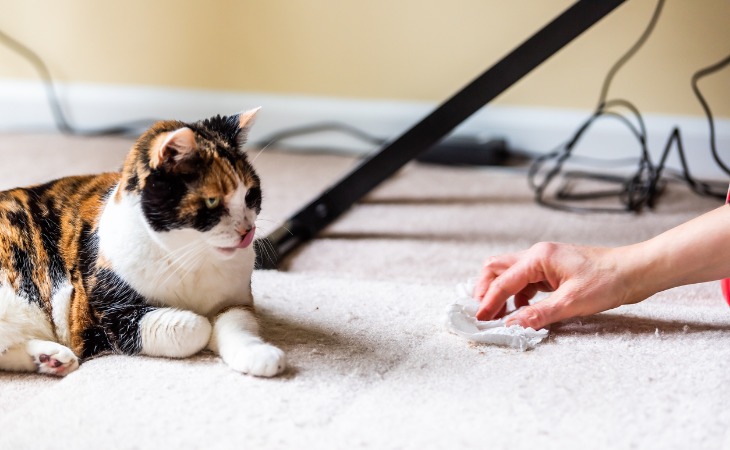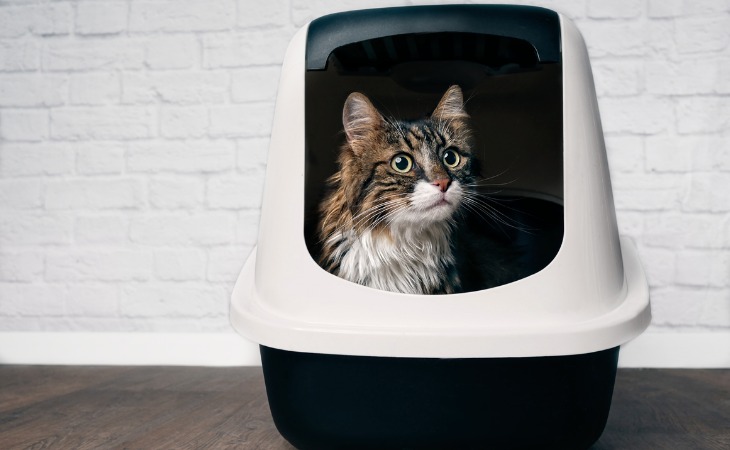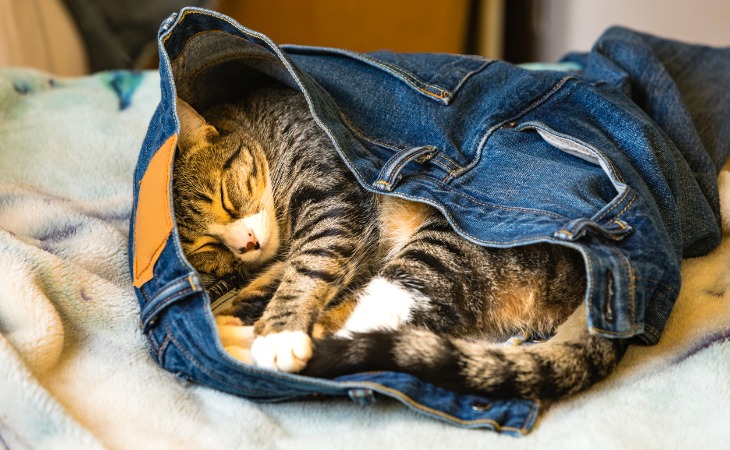One of the most frustrating things for cat owners is when their cats urinate or defecate on their clothes or around the house. There are several reasons for this behavior. For example, it can be related to your cat’s health, to behavior issues, or most often to the placement or cleanliness of your cat’s litter box. In this article, we will explain some of the most common reasons why cats urinate on clothes.
Feline lower urinary tract disease
Urinary disorders are very common in cats. Among the most common of these disorders is feline lower urinary tract disease or FLUTD for short. The lower urinary tract is made up of the bladder (where urine is collected and stored) and the urethra (where urine exits the body). It is important to know that some cats can be genetically predisposed to this disease. The risk factors are mainly age, obesity, poor diet, or dehydration.
One of the most common symptoms of feline lower urinary tract disease (FLUTD) is difficulty urinating. A cat suffering from this disease will urinate in small amounts all over the place, including on its owner’s clothes.
Kidney (renal) failure
Kidney or renal failure is a very common condition in older cats. However, older cats are not the only ones at risk. It occurs when the kidneys are no longer able to fully perform their function of filtering and purifying the blood. The condition can be classified as either acute renal failure (ARF) or chronic renal failure (CRF).
A few of the most common symptoms of kidney failure are excessive urinating and excessive drinking. Cats who suffer from kidney failure may have difficulty reaching their litter box in time to urinate. If your clothes just happen to be in your cat’s path, your cat may soil them.
Diabetes
Diabetes is a condition that prevents felines from using the sugar in their blood for energy. It affects an average of one in 200 cats. Felines with this condition drink a lot of water (excessive thirst), which inevitably results in frequent urination. It is not uncommon for them to urinate on their owner’s clothes without meaning to.

Marking its territory
Although cats have been domesticated for thousands of years already, cats have not totally forgotten their wild instincts. An example of this is cats marking their territory. This usually occurs when cats reach sexual maturity (puberty). Males often mark their territory as a sign of authority or to indicate to other cats the limits of their territory. However, even if they are alone, cats can do this. Cats usually mark their territory by scratching, rubbing against a surface, and urinating. This may be the reason why your beloved feline wets your clothes.
Females also urinate in this way during their heat cycle to attract males.
Stress
When cats are stressed, they sometimes exhibit unusual behaviors. Getting a new pet, moving, or having frequent visitors are just some of the events that can intimidate them. When cats are put into stressful situations, they can sometimes behave strangely in an effort to protect themselves. It is not uncommon for stressed cats to start urinating outside their litter box to get your attention.
A dirty or badly positioned litter box
Felines are clean animals by nature. Domestic cats are certainly no exception to this. They are often repulsed by uncleanliness. If your cat continues to pee on your clothes and the reasons mentioned above are ruled out, the problem may be the litter box itself.
Cats prefer to relieve themselves elsewhere if their litter box is very dirty. As cats don’t really like to urinate on hard surfaces, they can sometimes urinate on carpets, mattresses, or clothes, which are much softer.
The placement of your cat’s litter box can also be the cause of the problem. Getting to a litter box that is too high can be a challenge for your cat, especially if it is old.
Also, if you hide the litter box in an unfrequented or hard-to-reach area, it may not be suitable for your furry friend.

Another cat is preventing access to the litter box
You may not notice it but when you have several pets, they always establish a hierarchy among themselves. The dominant cat may monopolize the litter box and prevent other cats from having access to it. The other cats, being deprived of this dedicated space, will seek another comfortable place to relieve themselves. This place can sometimes be a pile of clothes.
What should I do if my cat urinates on my clothes?
Depending on the reasons why your cat pees on your clothes, several solutions are possible:
Consult a veterinarian
If you notice this behavior in your cat, it is important to make sure that an underlying condition is not the cause. You can do this by visiting your veterinarian. Your vet should be able to determine what is wrong with your cat. Unlike a human patient, pets cannot speak. Take the time to observe your pet at home to identify any of the symptoms described above, such as excessive urinating or excessive drinking. This will help the veterinarian with the diagnosis. With this information, your veterinarian will be able to do a complete examination to identify the source of the problem. Depending on the case, vets can perform :
- Urine tests;
- One or more x-rays;
- A blood sample and a blood test.
The results of this examination will allow your veterinarian to provide your cat with the appropriate care. In the case of diabetes, for example, your furry friend’s blood sugar level will be able to be stabilized with proper nutrition or insulin.
However, sometimes, the cause of this behavior is not related to a cat’s health.
Contact a cat behaviorist
If you suspect that anxiety and stress are the reasons why your cat is peeing on your clothes, you can call a cat behaviorist to find out. Specialists can determine the cause of your cat’s stress and suggest therapy. You can help your cat by making sure that you give your cat plenty of attention and love.
Spay or neuter your cat
When your cat pees on your clothes to mark its territory, you can talk to your vet about spaying or neutering your cat. Neutering is done for males and female cats are spayed. This operation can help to dissuade this territory marking behavior. However, spaying and neuterin is less effective if your cat has already reached puberty (sexual maturity).
Clean your litter box regularly
Cats can be particularly finicky about the cleanliness of their litter box. To ensure that your cat has a clean litter box, it is recommended to clean the litter box daily. If you have many cats, you will need to purchase more than one litter box. Follow the simple rule of having one extra box for the number of cats you have. For example, if you have two cats, it is best to have three litter boxes.
Now you have some reasons why your cat urinates on your clothes. Whether the reason is medical, behavioral, or hygienic, many solutions exist to dissuade this behavior. Good luck and remember to be gentle with your cat.

